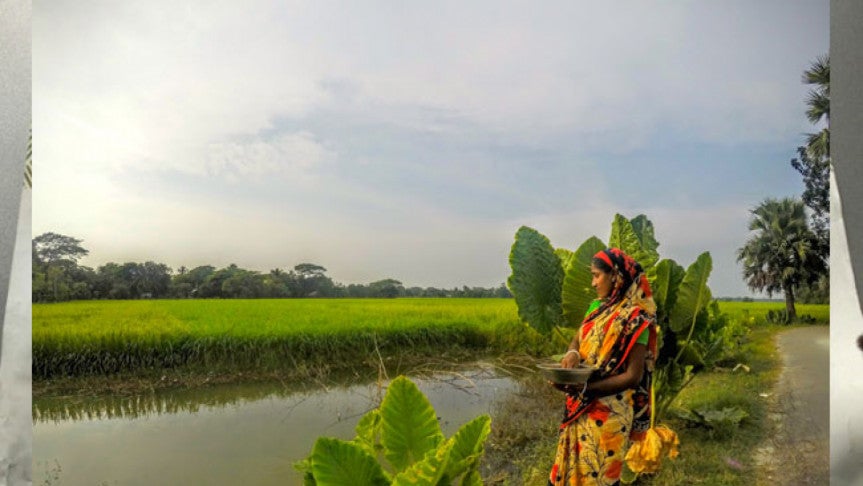Managing water, changing lives

Water is the lifeblood of agricultural production. At the same time, poor water management can do the opposite. More agricultural production means adding more jobs and value to the economy. Scientists from International Water Management Institute (IWMI), International Rice Research Institute and WorldFish are hypothesizing that poor water management is the issue that separates the more than eight million people of Bangladesh who depend on the coastal zone land from greater food security and resilience. In addition, the communities themselves may hold the key.
The coastal zone in Bangladesh is divided into 139 low-lying tracts of land surrounded by embankments, called polders. This is where farmers plant their crops. The polders provide some protection against tidal floods and saline water intrusion, but they are surrounded by tidal rivers that vary seasonally between saline and fresh water. This constant flux naturally affects crops.
But, communities have the option to manage water availability and quality in a polder via a network of drainage canals and sluice gates; the challenge, however, is to coordinate the management of water within a polder or sub-polder because the topography is not always the same.
Prankrishna Golder, a farmer of polder 30 said, ‘Our yield depends on weather. Earlier we could earn profit from Robi crops. But, last two years, we couldn’t even harvest sesame for rain. The sesame died for heavy rain before they grow for harvesting.’
One experiment includes speeding up the drainage of polders after the rainy season to give farmers time to grow and harvest profitable, nutritious crops such as sunflower, maize and wheat during the Robi [winter] season, before such crops may be destroyed by pre-monsoon rains. Growing a successful winter season crop could significantly contribute to a family’s food security and income, but it is only possible when water management is coordinated within the polder.
Rehana begum, one of the beneficiaries of the experiment site at polder 30 said, ‘We harvest High Yield Varity of rice this year under the project. I hope that we can harvest rice earlier. As a result, we can plant sesame or Mung. If we can plant them earlier then we can harvest them before rain. So there will be no risk.’
For the low level grounds where water is locked for long time, farming rice and fish together can boost agricultural production. The culture of fish in paddies can raise the productivity of land. Although rice-fish culture has been an area of research for many years, Bangladeshi rice farmers have not adopted it widely. A farmer should aim to maximise returns from his far operations given limitations on his land, labour and capital resources and the production options available to him. In Fultala village of polder 30, the community has introduced Rice-Fish farming to earn more profit by farming fish.
Jaba Mondal, a participatory farmer of this project. She is harvesting Aman along with fish in her field as a part of the community. Unlike every year, she is expected to earn more money from fish this year to support her family.
From this 21 hectre experimental research in Fultala village, 20,662 kg fish is harvested which is sold at market at price 260,675 taka and the 63 farmers of the community consumed more 485kg to fulfil their daily nutrition.
For comparably high ground in the polder the main issue for agricultural production damage is heavy rain and natural calamities before the harvesting for late planting of Robi crops.
With community water management, the result is promising. The production for high yielding rice is 4-6 metric tons/year where the Local Varity yield 2.3-3 metric tons/hector. Moreover, high yielding rice grows faster which gives the time for early planting of Robi crop.
Thus, building water-smart communities will led us unlock product potential of the coastal zone. It requires greater coordination among institutions responsible for water management, food production and dissemination systems. Initiatives should be taken for more investment in infrastructure improvements inside the polders to enable drainage and to create hydrologically defined water management units (WMU). Water management requirements will depend on the preferred cropping systems/technologies that farmers within a WMU want to adopt. There are tremendous opportunities to improve food security and livelihoods in the coastal zone with existing advances in crop and aquaculture technologies and available water resources across all lands and salinity regimes. Many well-tested, short duration, stress-tolerant rice varieties, and high-yielding, high-value Robi varieties are now available. Additionally, newly available aquaculture species can be raised together with rice. Surely, these will lead us to food security, more jobs, income generation and resilience.
*The author is working in an international research organisation and a Hubert H Humphrey Fellow, University of Maryland, USA.

 Mahabubur Rahman
Mahabubur Rahman




